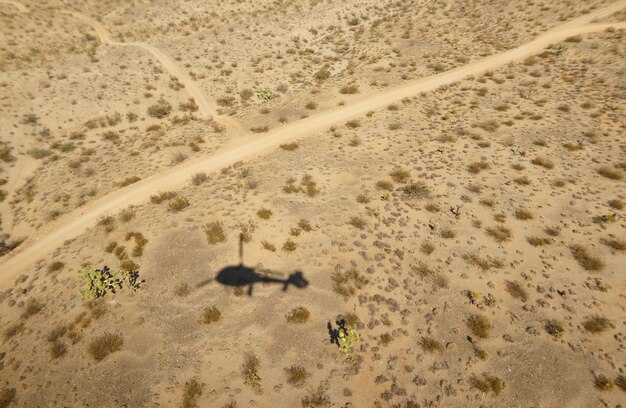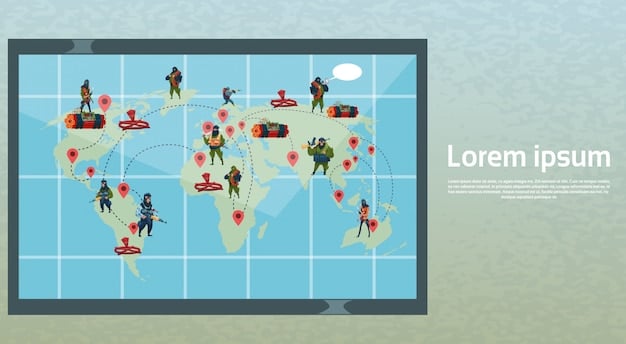Understanding the Implications of US Military Presence Globally

The US military presence in global hotspots has implications ranging from strategic deterrence and regional stability to complex socio-political and economic consequences, influencing international relations and local dynamics.
The **implications of the US military presence in key global hotspots** are vast and multifaceted, shaping international relations, regional stability, and local socio-economic landscapes. Examining these implications is crucial for understanding the complexities of modern geopolitics.
The Strategic Role of US Military Bases Worldwide
The presence of US military bases serves as a strategic cornerstone for projecting power and maintaining global influence. These bases facilitate rapid response capabilities and act as deterrents against potential adversaries. Understanding their strategic importance is key to grasping US foreign policy objectives.
Deterrence and Power Projection
US military bases provide a forward deployment capability, enhancing deterrence and enabling swift responses to crises.
Maintaining Regional Stability
These installations play a role in maintaining stability by deterring aggression and providing assistance to allies.

- Enhanced Rapid Response: Quick deployment capabilities in case of emergencies.
- Deterrence of Aggression: Discouraging potential adversaries from hostile actions.
- Support for Allies: Providing logistical and operational support to partner nations.
- Global Power Projection: Demonstrating and maintaining US influence worldwide.
The strategic positioning of these bases allows the US to project its influence and respond effectively to emerging threats, reinforcing its role as a global security provider.
Economic Impacts on Host Nations
The economic impacts of a US military presence on host nations are varied, including financial benefits and potential drawbacks. While bases can stimulate local economies and create jobs, they can also contribute to inflation and resource strain.
Job Creation and Local Economy
The establishment of a military base can lead to the creation of jobs and the infusion of capital into the local economy.
Potential Economic Disadvantages
However, the increased demand for resources and services can also drive up prices and create economic disparities.
Overall, the economic consequences are complex and depend on the specific context of each host nation.
Socio-Cultural Effects on Local Communities
The interaction between US military personnel and local populations often results in complex socio-cultural dynamics. These interactions can lead to cultural exchange and understanding but may also create friction and social challenges.
Cultural Exchange and Understanding
Interactions between military personnel and local residents can foster mutual respect and cultural exchange.
Potential Social Tensions
Differing values and lifestyles can sometimes lead to misunderstandings and social friction.
Managing these socio-cultural dynamics is essential for fostering positive relationships between the US military and host communities.

Geopolitical Implications of US Military Deployments
US military deployments have profound geopolitical implications, shaping alliances, influencing regional power dynamics, and impacting international relations.
Strengthening Alliances
The presence of US forces can strengthen alliances and enhance cooperation with partner nations.
Impact on Regional Power Dynamics
Deployments can also shift the balance of power in a region, potentially leading to tensions with rival states.
- Reinforcing Strategic Partnerships: Solidifying alliances through joint military activities.
- Balancing Regional Influence: Counteracting the influence of other major powers.
- Managing Security Dilemmas: Addressing potential security threats and conflicts.
- Promoting Diplomatic Solutions: Using military presence to support diplomatic efforts.
These deployments reflect not only military power but also diplomatic strategies aimed at maintaining stability and advancing US interests.
Ethical Considerations and Human Rights
The ethical dimensions of US military engagements are significant, particularly concerning human rights and international law. Ensuring compliance with these standards is crucial for maintaining legitimacy and moral authority.
Adherence to International Law
All military operations must adhere to the laws of war and international humanitarian law.
Protection of Human Rights
Protecting the rights and well-being of civilians in conflict zones is a fundamental ethical obligation.
Balancing strategic objectives with ethical responsibilities is a persistent challenge in military deployments.
Environmental Impacts of Military Activities
Military activities can have significant environmental impacts, ranging from pollution to habitat destruction. Minimizing these impacts through sustainable practices is increasingly important.
Pollution and Contamination
Military operations can generate pollution from fuel, explosives, and other materials.
Habitat Destruction and Biodiversity Loss
Base construction and military exercises can lead to habitat destruction and biodiversity loss.
Implementing environmental safeguards and promoting sustainable practices are essential for mitigating these effects.
Future Trends in US Military Presence
Looking ahead, future trends in US military presence will likely involve adapting to new technologies, evolving threats, and changing geopolitical landscapes. Innovations in military technology, such as drones and cyber warfare, will reshape how forces are deployed and utilized.
Technological Adaptations
New technologies will transform the nature of military operations and deployments.
Evolving Threats and Geopolitical Shifts
Changing global dynamics will require new strategies for maintaining security and stability.
These trends suggest a future where adaptability and innovation will be key to maintaining an effective US military presence.
| Key Aspect | Brief Description |
|---|---|
| 🌍 Strategic Role | Power projection and rapid response capabilities. |
| 💰 Economic Impact | Job creation versus inflation risks. |
| 🤝 Geopolitical | Alliance strength and regional balance influences. |
| 🌱 Environmental | Pollution concerns and sustainable practices. |
Frequently Asked Questions
▼
The primary advantage is the ability to quickly project power and respond to crises anywhere in the world, enhancing deterrence and maintaining global influence.
▼
It can stimulate the local economy through job creation and investment, but also lead to inflation and increased demand for resources, creating economic imbalances.
▼
Differing values and lifestyles can lead to misunderstandings and social friction, impacting relationships between military personnel and local communities.
▼
They can strengthen existing alliances by facilitating joint military activities and providing a sense of security to partner nations, while also impacting regional power balances.
▼
Concerns include pollution from fuel and explosives, habitat destruction, and biodiversity loss, necessitating the implementation of stringent environmental safeguards.
Conclusion
In summary, the implications of the US military presence in key global hotspots are complex and span strategic, economic, socio-cultural, geopolitical, ethical, and environmental dimensions. Understanding these multifaceted impacts is crucial for informed discussions and policy decisions regarding US foreign policy and global security.





